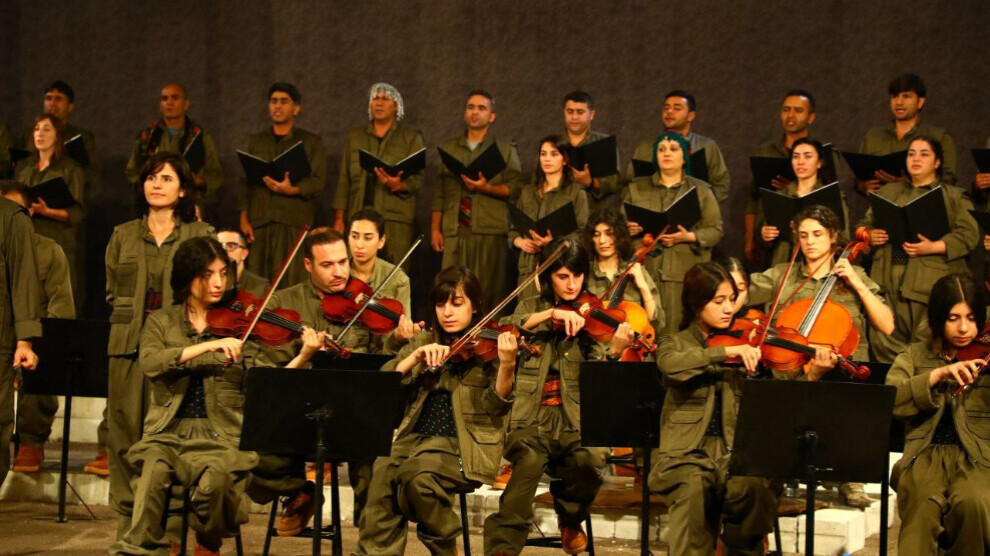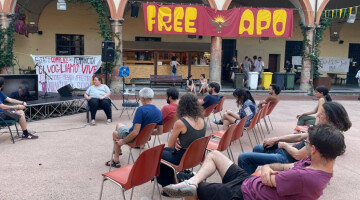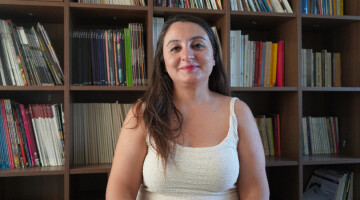On the occasion of the 44th anniversary of the foundation of the PKK, the Kurdish freedom movement has produced a new milestone of the guerrilla's creative power. The cultural and music group Awazê Çiya, which consists of guerrilla fighters and is known for its creative music videos, has created the work Destana PKK (The Epic of the PKK) in two years of preparation in cooperation with Sine Çiya, the cultural movement in Rojava TEV-ÇAND, the Rojava Film Commune and the Pargîn Cultural Centre.
MUCH MORE THAN A MUSICAL
Like the classical epics of Gilgamesh or Homer, the work is written entirely in rhyme with continuous verse. The scenes, lyrically accompanied by the narrator, a supra-temporal female embodiment, are complemented by a 46-voice choir in bass, alto, tenor and soprano and by alternating solos. A large orchestra with saz, guitar, bass, cello, piano, violin and many other musical instruments gives emphasis to the film's political and historical message of resistance. The text and music are by Awazê Çiya. It would be too short-sighted to call the work only a musical; it is a synthesis of musical, epic, documentary and re-enactment of historical events, in which great importance is attached to the symbolism of the images. It is impressively shown, for example, how Mazlum Doğan sacrifices himself in prison resistance, thereby fanning the fire of the freedom struggle represented by dancers.
FROM THE NEOLITHIC TO ROJAVA – AN UNFINISHED STORY
The piece begins in the Neolithic, describing the emergence of domination and patriarchy, but also of resistance against it. The piece then focuses on the division of Kurdistan, the various resistance movements and finally the PKK. Decisive stages in the development of the PKK and its free ideology, from the assassination of Haki Karer, which was answered by the founding of the PKK in 1978, to the prison resistance of Amed, the beginning of the armed struggle in 1984, the betrayal of the KDP and the bloody 1990s, the international conspiracy and the revolution of Rojava are described lyrically and accompanied by songs. Symbolism plays a major role here, so what cannot be described in words can possibly still be told.
"THE PKK HAS MANY COLOURS”
Têkoşîn Cûdî and Seyit Rıza Silbus from Awazê Çiya were the main contributors to the work. They told ANF about the reasons, the unusual form and the genesis of the project.
Têkoşîn Cûdî said: "With an epic as a musical, we have tried to present a certain period of PKK history to the public. In our project, we underline that the PKK's epic is far from over, but is always being written further. There were many opinions from the audience about the work. Some thought it was a feature film, others a documentary, others a music clip. The PKK has many colours and this is expressed in the work. There is cinema, theatre, poetry, lyricism, dance, folklore and music clips in the epic. All fields of art are covered."
"A COLOURFUL NOVELTY CREATED IN TWO YEARS”
Têkoşîn Cûdî emphasised that the group wanted to show the history of the PKK in its full historical context and said the following about the relationship between music and image: "The music was composed according to the scenes. Each sound was adapted to the visuals. We started the practical work in 2020 and aimed to complete it on the anniversary of the founding of the PKK in 2022. It was work that had been started earlier. The work on the lyrics and music had already started but had not yet been put into practice. More than 46 people are part of the choir. It was a new experience and comprehensive work. It is something quite different, a novelty and a very colourful one at that."
MAKING THE IMPOSSIBLE POSSIBLE
Têkoşîn Cûdî described the musical as a new departure that was hardly thought possible under conditions of war: "Many people thought that such work was not possible, that the resources were too small and that the professionalism and creativity of the Kurds were limited to a certain point. We did this work in an impossible environment, in the middle of the war, and we showed the greatest determination in it. Actually, it is under difficult conditions that the most fruitful works come into being."
The work on the music was completed after two years, noted Cûdî and continued: "Some works take years, others are finished after months. The PKK epic was a very comprehensive project. A project of this scope should have taken longer, but thanks to the continuation of the revolution and the great efforts of those involved, it was completed in a shorter time."
"THE REVOLUTION IS ALWAYS CREATING ITSELF ANEW’
Asked about further projects and perspectives of Awazê Çiya, Cûdî answered: "The revolution goes on and on. It is not possible to talk about 'after the revolution'. The revolution is always recreating itself, renewing itself and becoming more diverse. People who are involved in art, especially revolutionary artists, are not limited to a single theme, they do not limit themselves and they take creative steps. As Awazê Çiya, we have not only projects but also short-term works. Besides the PKK epic, we have released dozens of programmes and clips and recorded three albums. The main work was the PKK epic, but we were involved in other projects every day at the same time. We will always pioneer the art of the revolution and the people and the struggle with our works. Our goal and project base on revisiting, reviving and recreating the original form of the people's culture and art."
50-YEAR FREEDOM MARCH RENDERED IN KURDISH ORAL TRADITION
Cûdî's comrade-in-arms Seyit Rıza Silbus emphasised that in the PKK epic, music and narrative style are in the foreground. He explained why the musical/epic form was chosen as follows: "Music and story have an important place in Kurdish culture. It is both the stories and the music that have carried Kurdistan and Kurdish culture from early times to the present day. The events that have taken place in Kurdistan have been passed on through stories and music until today. Just as Kurdish history and culture have been passed down through music and stories, we wanted to tell the story of the PKK."
"THE PKK CANNOT BE EXPRESSED ONLY THROUGH AN ARTISTIC WORK”
However, the PKK epic cannot be considered as an artistic work alone, said Rıza, adding, "The PKK epic expresses the historical dimension of the PKK only in broad strokes, it is treated in the style of a biography or choreography. Since it is about a 50-year freedom march, it would be weak to simply narrate it and process it like that, even if it had been filmed. It would not be correct to say that the project describes the PKK. It is more correct to say that we did that in the project as far as we could tell it. Our film project is finished, but the history of the PKK cannot be expressed only through an artistic work, and there are definitely aspects missing."
"EXPRESSING THE HISTORY OF THE PKK AND THE GUERILLA THROUGH ART”
Regarding the conditions of its creation, Seyit Rıza said: "We organised ourselves according to the reality of war, and it was in this environment that the epic came into being. We took this into consideration and thought about the possibility that war would break into the middle of the project and we would not be able to finish it, but we decided to carry out the project with great perseverance and determination."
Seyit Rıza stressed the importance of expressing the reality of the lives of the people and the guerrillas for the struggle for revolution through music. He concluded by saying: "It is our basic principle to express the history of the PKK and the reality of the guerrilla, struggle and life through music and art."















